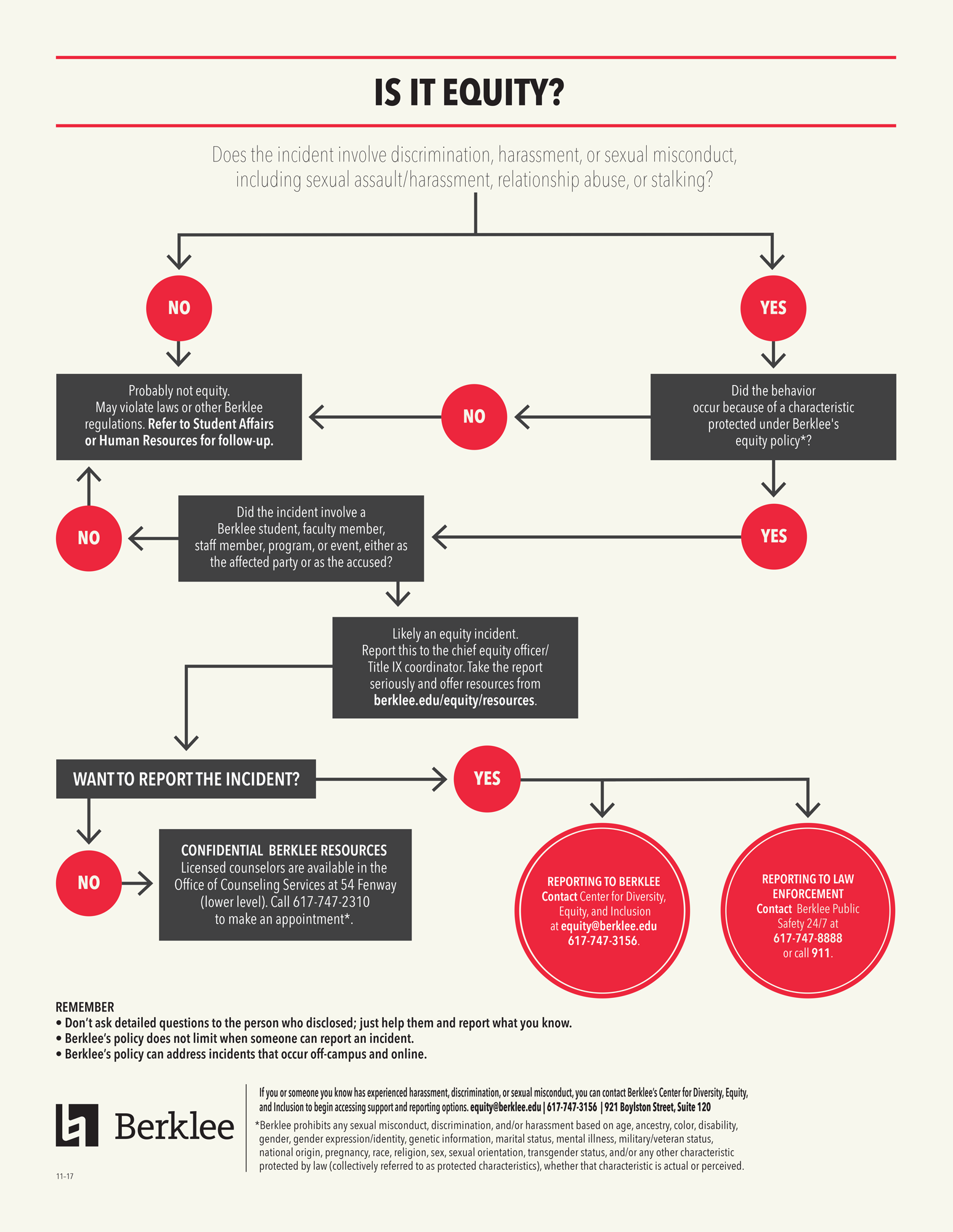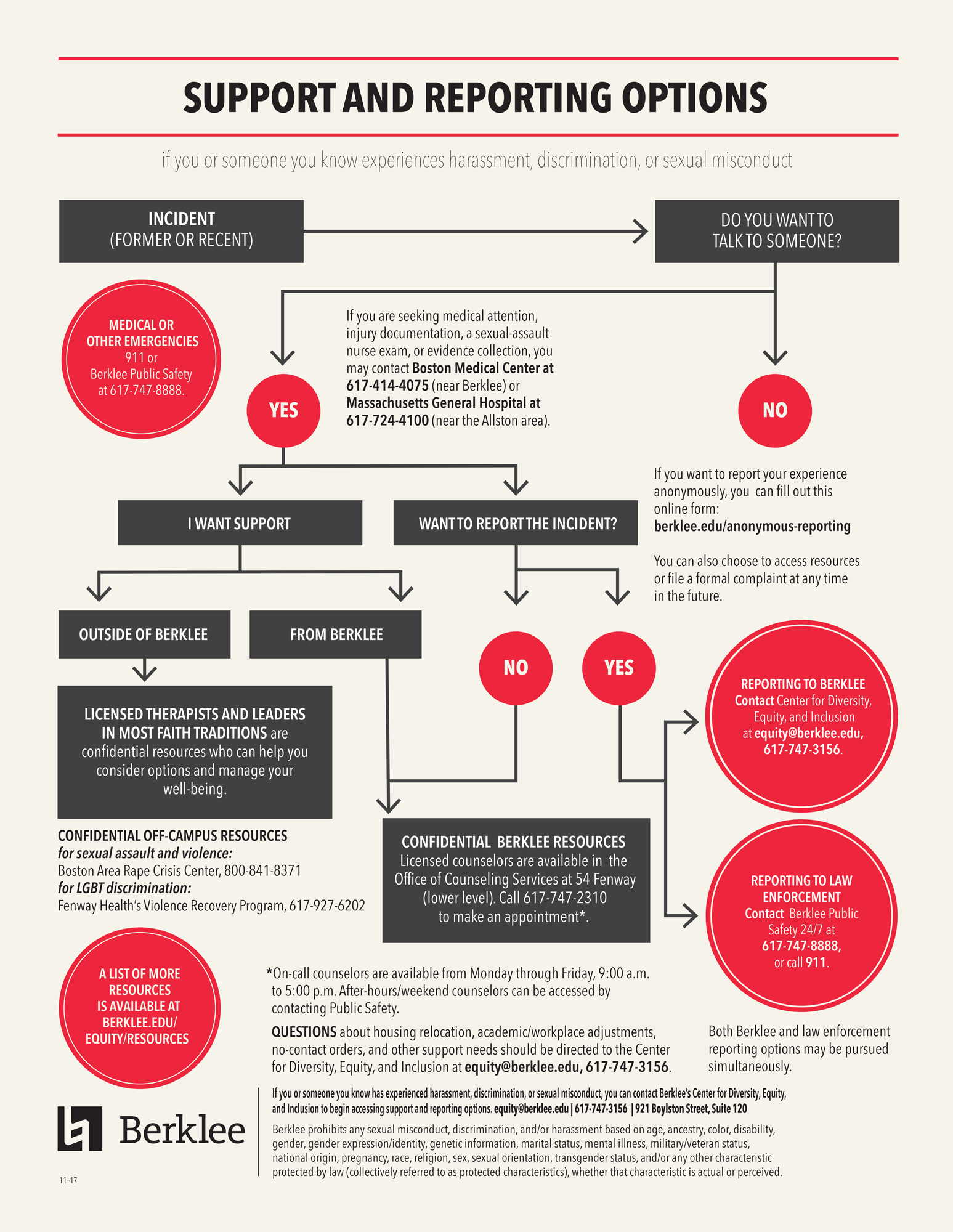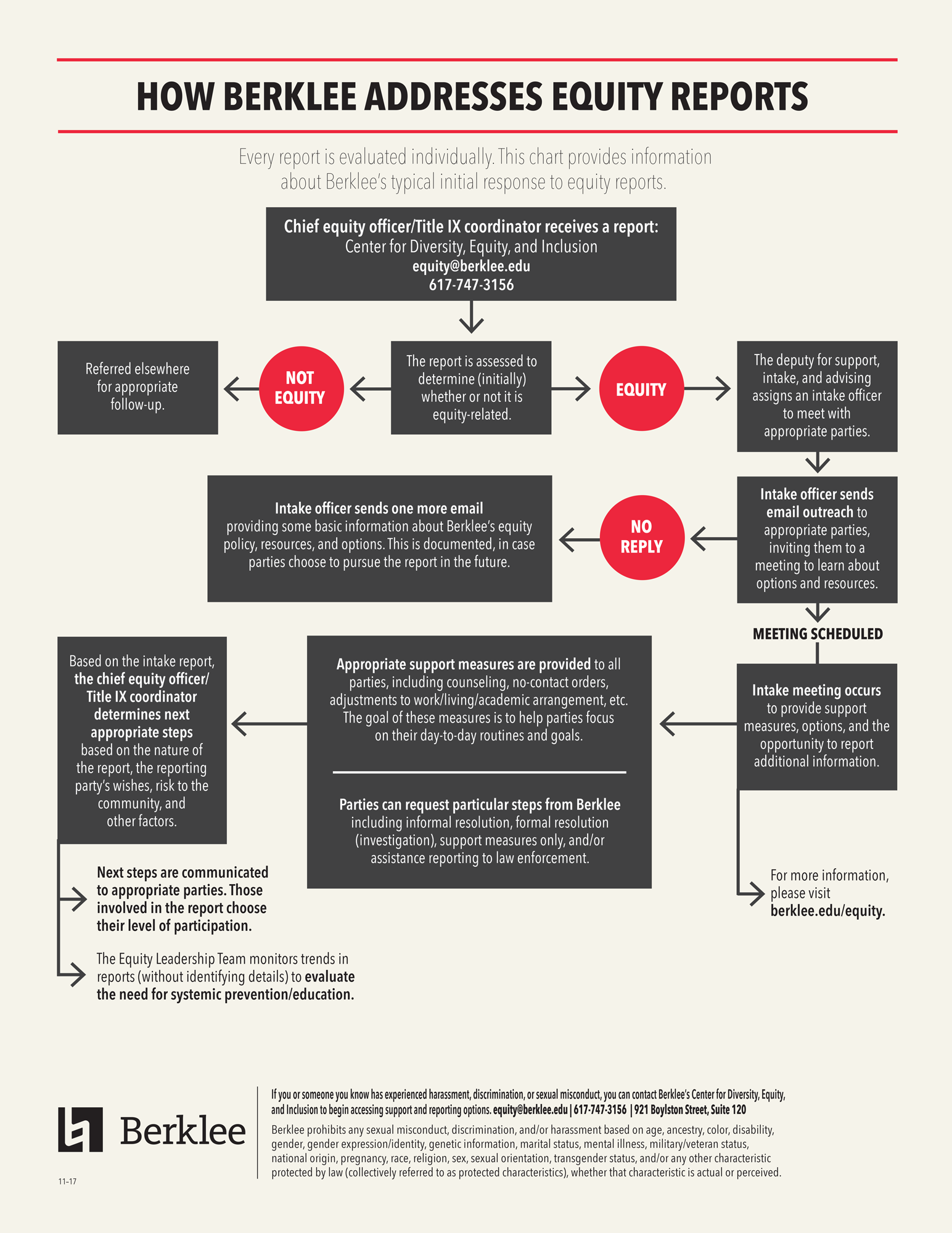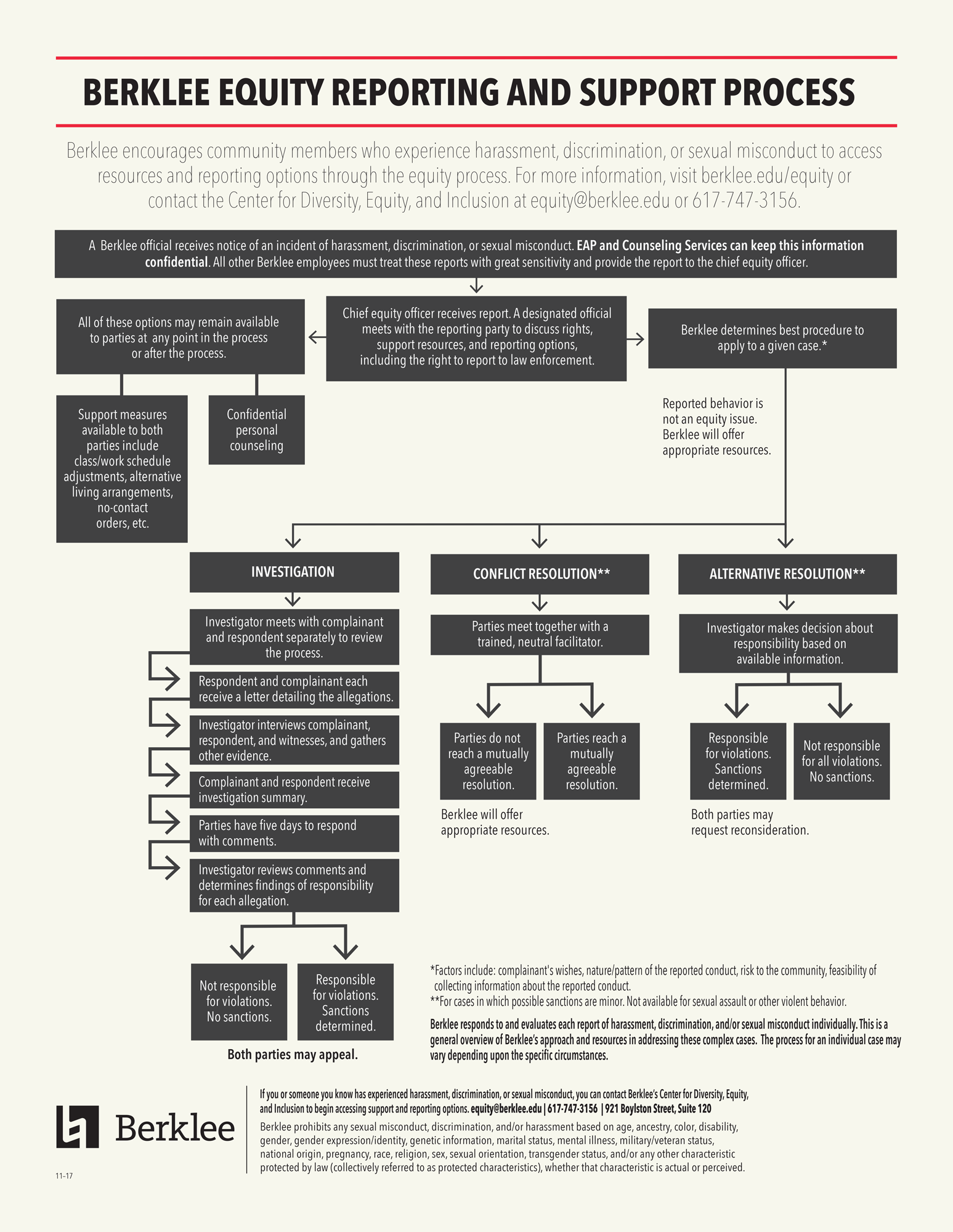Berklee College of Music's Equity Policy and its Adaptation to the European Environment
Background
Despite efforts to investigate claims and to act on findings relating to sexual harassment at Berklee since President Roger Brown’s arrival to the institution almost 17 years ago, recounts of a number of incidents of sexual misconduct occurring over a number of years at Berklee were published in an article by the Boston Globe on November 2017. Whereas the institution had already established policies and procedures to properly manage cases of sexual harassment by then, community members called for a more thorough approach.
As a response to this important feedback, and building on the work that had already started since Brown’s arrival at Berklee, a comprehensive Diversity and Inclusion strategy was elaborated and incorporated as an institutional priority in 2017, with a robust Center for Diversity, Equity and Inclusion also launching during the 2017-2018 academic year.
The new strategy focused on improving the climate, systems and practices within all learning environments within Berklee. In order to do so, it was important to recognize the multilayered, transversal approach to the work required, and so a number of working areas (listed below) was defined with the aim of setting a clear action plan within each of them, and evaluate how these areas should exist in relation to each other:
- Campus climate
- Inclusive excellence in curriculum and pedagogy
- Inclusive spaces and accessible campus
- Recruitment, hiring, promotion and retention
- Training dialogue and practice
- Student access, engagement, and success
- Equity policy and process1
Berklee’s Equity Policy
The following statement is drawn from Berklee’s notice of non-discrimination:
Berklee, as an educational institution and as an employer, does not discriminate on the basis of age, ancestry, color, disability, gender, gender expression/identity, genetic information, marital status, mental illness, military/veteran status, national and ethnic origin, pregnancy, race, religion, sex, sexual orientation, transgender status, or any other characteristic protected by law (collectively referred to as “protected characteristics”).
Berklee adheres to all federal and state civil rights laws barring discrimination, including, but not limited to, Title IX and Title VI of the Education Amendments of 1972, Title VII of the Civil Rights Act of 1964, the Americans with Disabilities Act, the Rehabilitation Act, and the Massachusetts Equal Rights Law. Berklee is committed not only to compliance with these mandates, but to promoting a culture that is in line with the values these civil rights laws envision.
Notice of Non-Discrimination / Title IX Compliance Statement
The main mission of Berklee’s Equity Policy is to ensure that all members of Berklee’s global community (Berklee Boston, Boston Conservatory, Berklee Online and Berklee Valencia) are able to learn, teach and work in a supporting and caring environment, prohibiting and addressing discrimination and harassment based on any characteristic protected by US law (collectively referred to as “protected characteristics”), whether that characteristic is actual or perceived.
The Equity Policy and Process had already been implemented at Berklee prior to the Boston Globe’s article from November 20172 and indeed had also gone through an initial survey of student experiences related to the equity policy to improve its efficiency by Spring 2016. With said, 2017’s public demand urged the institution to strengthen the whole system under this new framework. Work was immediately enacted on the following areas:
Creation of an Equity working group – made up of students, staff, faculty and senior leadership of Berklee College of Music – who met regularly over the final two semesters of the 2017-2018 academic year to closely examine Berklee’s culture, develop a shared understanding of the foundational issues surrounding harassment, discrimination, and sexual misconduct that impact the lives of students, faculty, and staff, and recommend ways to create an inclusive and respectful community. External expertise was called in to help guide this work forward. The working group also focused on tapping into the creativity and artistry of the community as a vehicle for change and inspiration.
Establishment of a clear timeline – a working document designed to support the implementation and rollout of the plan to foster a culture that promotes respect, equity, and creativity, and that introduced, amongst others, the below measures:
- New positions were designed and hired to ensure the implementation of the policy as it relates to prevention, education of the community, support, and eradication of prohibited behaviours. New positions included a Chief Equity Officer and Title IX3 Coordinator; Deputy for Equity Administration, Intake, and Support; Deputy for Equity Investigations; Assistant Vice-President for Diversity and Inclusion; Assistant Dean for Diversity and Inclusion; Assistant Director for Diversity and Inclusion; permanent Counselor/ Survivor Advocate; and a Case Manager.4
- Berklee’s HR team committed to increase the pipeline for diverse candidates, ensuring that the language used in job positions attracts women and diverse applicants and that they posted on job boards and professional organizations and associations that attract diverse candidates.
- Training sessions for students, staff, and faculty were organised on reporting, resources, consent, and bystander intervention. Bystander intervention training is now included in the curriculum of first semester students.
- A ‘responsible employee’ mandate was communicated to all staff and faculty as a reminder that all Berklee employees are required to report any violation or possible violation of the equity policy (including discrimination, harassment, and sexual misconduct) that they might observe or learn about, to Berklee’s Chief Equity Officer. All Berklee employees are considered responsible employees and training is provided to new hires to ensure understanding and compliance during their on boarding. Licensed professional counselors acting in that professional capacity (and who are thus designated confidential resources) are exempted from this rule.
- A comprehensive and campus-wide messaging and promotions campaign clearly stating what incidents should be reported and how, was produced for the Boston and Valencia campuses.
- ‘Moving Forward: A Speaker Series on Diversity, Equity, and Inclusion’ was launched aiming to further Berklee’s goal of inclusion and respect for all community members through a series of conversations open to all students, faculty, and staff and geared towards examining community values around diversity and inclusion, reflecting on present dynamics, and growing together as a community.
- A new relationships policy for Berklee faculty, staff, and others engaged to perform services at or for Berklee was approved and implemented. This new policy prohibits dating, romantic, or sexual relationships between Berklee students and those working for or on behalf of Berklee, as well as between supervisory employees and those who report within the same line of management, with limited exceptions as set forth in the policy.
Transparency, clear communication and external auditing – updates from the senior leadership team on the progress of specific actions such as the above were regularly shared throughout the following year with all community members across the global institution. This progress led to the selection of Berklee’s Equity Team for participation in NASPA’s Culture of Respect Collective, a highly respected two-year program that assists colleges and universities in reviewing and improving their practices around sexual violence through self-assesment and targeted organizsational change. During academic year 2019-2020, Berklee joined 60 other schools from across the US who participated in the first two cohorts of the collective, as well as 40 other institutions that took part in the third cohort, including partners in Canada and Mexico.5
Adapting the Policy to Berklee’s European environment
One of the biggest challenges for Berklee’s campus in Valencia has been adapting this Equity policy, and its reinforcing measures, to fit its European reality, particularly as it relates to external variables (ie: labour laws and other legal and cultural implications) but also those that impact the internal life of the campus (ie: available campus resources, expertise, nature and length of academic programs, student body composition…) Needless to say, some of the aforementioned policies and resources were incorporated immediately (ie: responsible employee and relationship policies, and others) but for the purposes of highlighting this adaptation process, below are some of the additional actions and observations that the Valencia campus took on board over the past four years to adapt the Equity policy to its particular context in order for it to serve its purpose:6
- Formulation of a Valencia Equity Leadership team – a team of selected and properly trained staff members from different departments that respond to equity related incidents as they emerge, as either intake officers and / or investigators. This team juggles their equity role with other campus responsibilities, and so to ensure due process is followed, they closely collaborate with Boston counterparts in similar positions to manage complex incidents. This can, at times, slightly delay the resolution of an incident.
- Access to external legal advice: Labour laws in Spain as well as those related to GDPR in Europe differ from those in force in the US. This, at times, impacts the Spanish campus’ ability to apply approved interim measures or final sanctions that are usually enacted at the Boston campus in cases of a similar nature. Spanish external legal counsel may be consulted during complex processes if deemed necessary.
- Collaboration with local officials to support community members in an immediate response: A close examination of local protocols (ie: police and public health administration) to support and assist as needed was also carried out by those in the first line of response (ie: Berklee’s public safety department, medical team and student services) in order to be ready to support community members off campus if they become involved in a sexual assault.
- Connection to similar programs in Spain: The Association of North American University Programs in Spain (APUNE) is also a valuable source of expertise and collaboration connecting US programs in Spain dealing with cases of sexual assault. APUNE provides its members resources, training, connections and expertise that is specific to the location and the nature of programs abroad.
- Educational work, and ownership of community membership: Orientation sessions explaining Berklee’s Equity policy, as well as behavioural expectations for community members as it relates to diversity, equity and inclusion, are carefully presented to students, taking into account the nature of the campus and the specific cohorts that arrive to it every fall. Additionally, co-curricular programming throughout the year is offered to complement the academic experience by highlighting ethical practices within the music industry offered by guest speakers from around the world. Initiatives addressing social themes in the context not only of the life of the campus, but also the music industry as a whole, aim to turn the focus on the importance of becoming engaged citizens, agents of social change, and active bystanders and allies.
- Support for student leadership initiatives and encouragement of student feedback: The campus also considers financing, advising and supervising student initiatives that explore the promotion of gender equality as well as anti racist and sustainable practices in the music industry. Additionally, through the Student Advisory Board, students are also encouraged to share their feedback, and that of their peers, with the Valencia Executive Team. This open and regular line of communication between students and leadership is fundamental to understanding campus’ dynamics every year, as well as the most pressing needs of the student body as they emerge.
- Diversifying the pool of candidates for employment opportunities in the faculty and staff bodies: Labour laws in Spain can potentially consider any affirmative action measures that the campus takes to diversify the faculty and staff body as discriminatory practices, and hence there are limitations to how the campus can incorporate diversity in hiring practices. Additionally, GDPR legislation also needs to be considered in the daily work of HR departments across Europe. The campus compensates these limitations by including specific language in job postings that encourages the application of candidates from diverse backgrounds. It also relies on professional networks from different departments to promote employment opportunities among candidates from diverse backgrounds; and it establishes onboarding processes that highlight the importance of inclusive practices at all levels of the organisation (ie: in the classroom as well as in each of the administrative departments). Specific training to explain the Equity policy, the role of all staff and faculty as responsible employees and Berklee’s relationship policy is also required during all onboarding processes of new employees.
- During the current semester, Berklee deployed a Diversity & Inclusion campus climate survey to understand how community members (students, faculty and staff) perceive Berklee’s climate and level of support for diversity and inclusion, as well as whether or not community members have experienced discrimination or harassment, and if so, how often. In order to comply with GDPR legislation in Europe, a number of questions that referred to demographic aspects of respondents were left out for the Valencia edition. Collected responses will be analysed with the understanding that Valencia-specific feedback might shed light on aspects to be considered about the academic experience but that might differ from those deemed as priorities by community members in Boston.
- Transparency and access to information related to rights and expectations: A ‘Diversity, Equity and Inclusion’ web section within valencia.berklee.edu was launched to include resources, services and initiatives that Berklee students have access to in Valencia. More importantly, it also offers an opportunity for prospective students to understand institutional priorities when it comes to prohibiting discriminatory practices at Berklee. Additionally, a feedback section on the main contact us section in this web section encourages stakeholders to share their general feedback, reminding them that equity-related reports are to be submitted through a specific Equity Policy Violations Reporting form where additional information is provided.
The ‘Diversity, Equity and Inclusion’ web section allows all community members to review their reporting options and includes detailed flowcharts explaining how Berklee addresses equity reports:
Further considerations in policy adaptation
Progress as it relates to the adaptation of the Equity process to Valencia will need to continue as the campus consolidates some of these services, while the global institution considers and re-examines others as a result of social movements pushing global communities to rethink the foundations on which they are built with a renewed energy (see Berklee’s commitment to inclusion echoing “the sentiments of many Berklee community members that institutions acting as systems of oppression—whether explicitly or implicitly—have an ethical duty to acknowledge their role in aiding supremacist values and the replication of oppression)”. As this ongoing process continues, there is a final set of considerations to take into account in the process of policy adaptation at the Valencia campus:
- Although the number of equity-related cases occurring at the Valencia campus is currently very small, when these incidents occur, depending on their severity, they can critically impact both the workload and the emotional wellbeing of those managing the case. Comprehensive training is fundamental to the success of the process for all involved parties.
- Respecting the privacy of the people involved in an equity investigation when the campus is small is not always easy to ensure, particularly when, to dutifully follow the process, a number of people might need to be involved. Furthermore, sanctions might imply issuing of no contact orders or other types of accommodations that hardly go unnoticed. It is critical that the maximum level of privacy and care is ensured at all times, despite this additional challenge.
- Every fall, the Valencia campus receives “new to Valencia” first year abroad, study abroad and graduate students, and these students usually only stay for a maximum of one year in this campus. This short cycle allows for a “fresh start” every fall, a unique opportunity to analyse student feedback from the year before and incorporate it to the design of future academic years.
- In a community that receives new students from more than 40 different countries every year, the institutional culture of the campus as it relates to diversity, equity and inclusion needs to be not only very well defined, but also well communicated at the start of every year. Cultural and social norms that might be accepted in some regions of the world, might not be accepted in others, and at Berklee’s campus in Spain, the additional need to review US-centric policies and processes through a non-US (international) lens is a reality in all its operations: from admissions, to human resources, to the extent of the support services available and more. All educational, preventive and disciplinary work taking place at Berklee’s Spanish campus to erradicate discrimination, harrasment or misconduct on the basis of, for example, gender, sexual orientation or race, needs to consider and incorporate the exogenous and endogenous mechanisms that impact students’ experiences in this context (Valencia, Spain and Europe) at the same time as the different starting points of community members at the time of their arrival.
Conclusion
This experience of working to establish inclusive practices that are contextualised, impactful, and sustainable over time, manifests how important it is to recognize the multilayered, transversal, intersectional and ever-evolving approach to the work required. To create a truly inclusive culture that is conducive to the success of all of its members, institutional policies are not enough. They are there to manage individual incidents, however complex they might be, but they cannot single-handedly eradicate the existing systems of oppression that have allowed for these incidents to perpetuate themselves across generations. The real, underlying, work lies on all the different pieces required to create institutional cultures where there is a shared understanding, and an embodiment, of the values to uphold; where all perspectives and backgrounds see themselves reflected; and where commitment to these values is seen across the board: from the executive leadership to the new students that arrive every year. The transformation of an institutional culture requires time, commitment, trust, resources, and the inherent understanding of the connection of the institution to the context in which it exists. It requires the necessary boldness to re-examine its past, and an unwavering willingness to own, and act upon, the position it wants to take in the future of this connection.
References
- Since this case study mainly focuses on providing an example of how issues of discrimination and harassment are managed within Berklee, and in particular, in its European campus, it will focus mainly on the final bullet point above: equity policy and process.
- How One College Has Set Out to Fix a Culture of “Blatant Sexual Harassment, The Chronicle of Higher Education, November 2017
- Title IX of the Education Amendments Act of 1972 provides that no person in the United States shall, on the basis of sex, be excluded from participation in, be denied the benefits of, or be subjected to discrimination under any education program or activity receiving Federal financial assistance.
- These positions suffered a number of changes during the 2021-21 academic year to better serve the changing environment in which Berklee operates.
- NASPA’s Culture of Respect Collective program was affected by the COVID-19 global pandemic in March 2020, after the initial self-evaluation carried out in December 2019. The program has since been reinstated, with initial recommendations related to the successful implementation of the Equity policy being shared with the institution.
- The legal responsibility for US colleges and universities to protect students from sexual assaults while studying abroad, or at a satellite campus outside of the US, has suffered some changes under new regulations issued by the US Department of Education in May 2020. Whereas prior to these new regulations, universities and colleges had been encouraged to investigate sexual assaults. and support victims abroad under Title IX (the law prohibiting sex discrimination at federally funded institutions) the new rules clearly state institutions are not obliged to investigate reports of sexual misconduct in their study aboad programs, or to provide support to those who report misconduct outside of the US. With this said, many international institutions receiving US students continue today to operate under the understanding that the university is expected to investigate sexual assault allegations occuring abroad as well as provide access to resources and support, in light of possible iterations of this law.
This article is a part of our ongoing series entitled How are diverse cultures integrated in the education of musicians across Europe? Other posts in the series can be found here.



